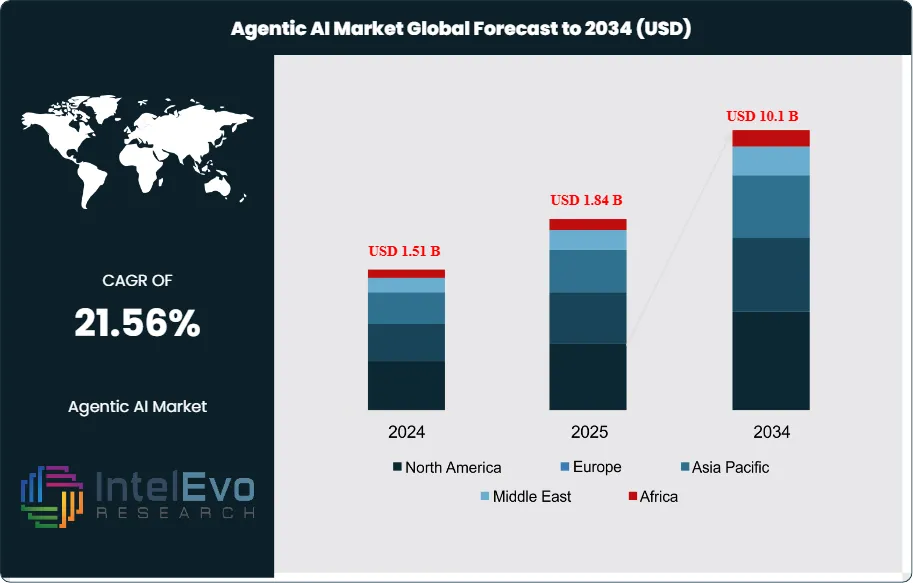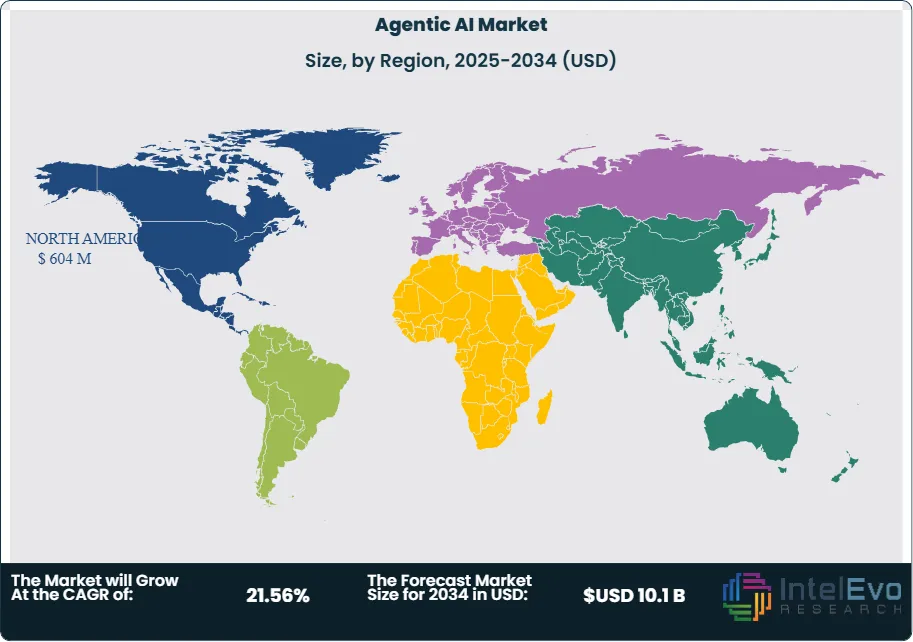
Agentic AI Market Size, Trends, Forecast & Growth | CAGR 21.56%
Global Agentic AI Market Size, Share, Analysis Report Platform (Cloud-based, Edge, Hybrid) End-Use (Large Enterprises, Small & Medium Enterprises (SMEs)) Application (Customer Service & Digital Assistants, Process Automation, Smart Manufacturing, Healthcare, Logistics & Supply Chain, Others) Industry Region & Key Players-Industry Segment Overview, Market Dynamics, Competitive Strategies, Trends & Forecast 2025-2034
Report Overview
The Agentic AI Market is projected to reach approximately USD 10.1 Billion by 2034, up from USD 1.51 Billion in 2024, growing at a CAGR of 21.56% during the forecast period (2024–2034). Agentic AI refers to artificial intelligence systems capable of autonomous goal-setting, decision-making, and action execution with minimal human intervention. These systems, often called “AI agents,” can perceive their environment, plan, adapt, and interact with other agents or humans to achieve complex objectives. The market is rapidly expanding, driven by advancements in large language models, reinforcement learning, multi-agent systems, and the integration of AI with robotics and IoT.

Get More Information about this report -
Request Free Sample ReportKey growth drivers include the need for intelligent automation, the rise of digital assistants, and the demand for scalable, adaptive solutions in sectors such as finance, healthcare, manufacturing, logistics, and customer service. Agentic AI is transforming business operations by enabling proactive problem-solving, personalized user experiences, and efficient resource management.
Regional analysis shows North America leading the market, supported by strong R&D, a vibrant startup ecosystem, and early enterprise adoption. Europe follows, with a focus on ethical AI and regulatory compliance, while Asia-Pacific is the fastest-growing region, propelled by government initiatives and rapid digital transformation.
The COVID-19 pandemic accelerated the adoption of autonomous systems, highlighting the value of resilient, self-managing AI in supply chains, healthcare, and remote work environments. Recent advances in agentic architectures, open-source frameworks, and multi-modal AI have further fueled market growth.

Key Takeaways
- Market Growth: The Agentic AI Market is expected to reach USD 10.1 Billion by 2034, driven by the need for intelligent automation, adaptive systems, and personalized digital experiences.
- Application Dominance: Customer service, process automation, and smart manufacturing are leading segments, leveraging agentic AI for autonomous workflows and decision-making.
- Platform Dominance: Cloud-based agentic AI platforms dominate, but edge and hybrid deployments are rising for real-time, privacy-sensitive applications.
- End-Use Dominance: Large enterprises are the primary adopters, but SMEs are increasingly deploying agentic AI for cost savings and operational agility.
- Driver: The ability of agentic AI to autonomously manage complex tasks and adapt to dynamic environments is a major adoption driver.
- Restraint: Challenges include explainability, safety, and regulatory uncertainty.
- Opportunity: Emerging markets and new use cases (e.g., autonomous supply chains, personalized healthcare) offer significant growth potential.
- Trend: The rise of multi-agent systems, open-source agentic frameworks, and human-AI collaboration is reshaping the market.
- Regional Analysis: North America leads in innovation and investment, Europe emphasizes ethics and compliance, and Asia-Pacific is the fastest-growing region.
Application Analysis
Customer Service & Digital Assistants Lead With Over 30% Market Share. Customer service and digital assistants are at the forefront of agentic AI adoption, using autonomous agents for 24/7 support, personalized recommendations, and proactive issue resolution. In manufacturing and logistics, agentic AI optimizes supply chains, manages inventory, and coordinates autonomous vehicles and robots. Healthcare is an emerging segment, with agentic AI supporting patient monitoring, diagnostics, and personalized treatment planning.
Platform Analysis
Cloud-based Platforms Dominate. Cloud-based agentic AI platforms are preferred for their scalability, integration capabilities, and access to large datasets. Edge and hybrid deployments are gaining traction in applications requiring low latency, privacy, or offline operation, such as autonomous vehicles, smart factories, and IoT networks.
End-Use Analysis
Large Enterprises Lead, SMEs Accelerating Adoption. Large enterprises account for the majority of agentic AI deployments, driven by the need for intelligent automation and competitive differentiation. SMEs are increasingly adopting agentic AI for customer engagement, process optimization, and cost reduction, especially in retail, logistics, and healthcare.
Region Analysis
North America Leads With Over 40% Market Share. North America dominates the Agentic AI market, supported by leading tech companies, strong venture capital, and early enterprise adoption. The U.S. is a key market, with significant investments in autonomous systems, digital assistants, and smart manufacturing.
Europe is the second-largest market, focusing on ethical AI, regulatory compliance, and human-centric design. The region’s emphasis on transparency and safety is shaping market standards.
Asia-Pacific is the fastest-growing region, driven by government initiatives in China, Japan, South Korea, and India. The region’s rapid digitalization, large population, and growing manufacturing sector offer significant growth opportunities.

Get More Information about this report -
Request Free Sample ReportKey Market Segment
Application
- Customer Service & Digital Assistants
- Process Automation
- Smart Manufacturing
- Healthcare
- Logistics & Supply Chain
- Others
Platform
- Cloud-based
- Edge
- Hybrid
End-Use
- Large Enterprises
- Small & Medium Enterprises (SMEs)
Region
- North America
- Latin America
- East Asia And Pacific
- Sea And South Asia
- Eastern Europe
- Western Europe
- Middle East & Africa
| Report Attribute | Details |
| Market size (2025) | USD 1.84 B |
| Forecast Revenue (2034) | USD 10.1 B |
| CAGR (2025-2034) | 21.56% |
| Historical data | 2018-2023 |
| Base Year For Estimation | 2024 |
| Forecast Period | 2025-2034 |
| Report coverage | Revenue Forecast, Competitive Landscape, Market Dynamics, Growth Factors, Trends and Recent Developments |
| Segments covered | Platform: (Cloud-based, Edge, Hybrid) End-Use: (Large Enterprises, Small & Medium Enterprises (SMEs)) Application: (Customer Service & Digital Assistants, Process Automation, Smart Manufacturing, Healthcare, Logistics & Supply Chain, Others) |
| Research Methodology |
|
| Regional scope |
|
| Competitive Landscape | OpenAI, Microsoft, Google / DeepMind, Amazon Web Services (AWS), Anthropic, IBM, Adept AI, Moveworks, Inflection AI, Rewind AI, Cognosys, SmartOSC, Artisan AI, Glean Technologies, Ampcome Technologies, The AnyLogic Company, Affectiva, Fetch.ai, SuperAGI, Wordsmith et al. (startups) |
| Customization Scope | Customization for segments, region/country-level will be provided. Moreover, additional customization can be done based on the requirements. |
| Pricing and Purchase Options | Avail customized purchase options to meet your exact research needs. We have three licenses to opt for: Single User License, Multi-User License (Up to 5 Users), Corporate Use License (Unlimited User and Printable PDF). |
Select Licence Type
Connect with our sales team
Why IntelEvoResearch
100%
Customer
Satisfaction
24x7+
Availability - we are always
there when you need us
200+
Fortune 50 Companies trust
IntelEvoResearch
80%
of our reports are exclusive
and first in the industry
100%
more data
and analysis
1000+
reports published
till date







